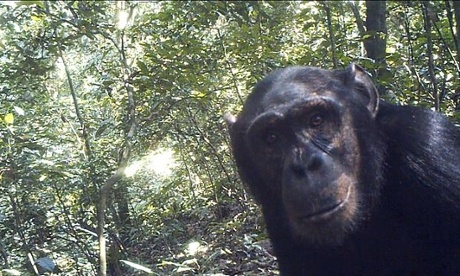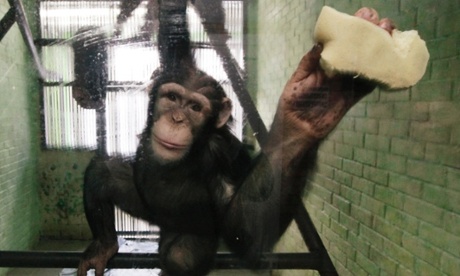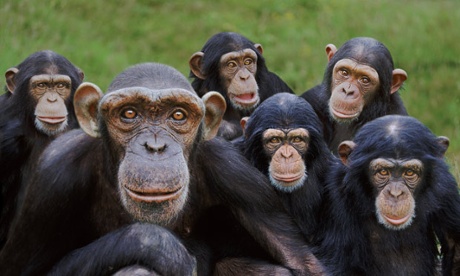Welcome
....to JusticeGhana Group

JusticeGhana is a Non-Governmental [and-not-for- profit] Organization (NGO) with a strong belief in Justice, Security and Progress....” More Details
The rise of the planet of the legal persons formerly known as apes
- Details
- Category: Uncategorised
- Created on Wednesday, 15 October 2014 00:00
 The rise of the planet of the legal persons formerly known as apes
The rise of the planet of the legal persons formerly known as apes
15 October 2014
Animal rights group will argue a claim of wrongful imprisonment of Tommy, a chimpanzee held in a trailer park shed in New York
Alan Yuhas
Chimpanzees could climb closer to the status of “legal persons” on Wednesday, should an animal rights group convince a New York court that an ape held in a trailer park shed may be wrongfully imprisoned.
Tommy, a 26-year-old privately owned chimp in Gloversville, New York, is the plaintiff in a suit brought on his behalf by Steven Wise and the Nonhuman Rights Project (NhRP), a group of environmental lawyers who seek nothing less than to break through the “legal wall … erected between humans and nonhuman animals”, as Wise told the Guardian.
But before the US can consider pongid personhood, Wise must argue before a panel of five appellate judges, who have agreed to hear out his petition for a writ of habeas corpus – an order demanding that the custodian of a prisoner prove a legally justifiable reason for detainment.
Unprecedented in a case of animal law, habeas corpus became Wise’s strategy after a career spent researching animal rights. Wise argues that the court should recognize Tommy as a limited legal person entitled to the bodily liberty that habeas corpus protects.
Presented as evidence to support his claim are affidavits from experts in cognitive science, psychology and behavioral biology, as well as Wise’s own rich knowledge of philosophical arguments and studies on chimpanzees. In the past 15 years, particularly, studies have convincingly shown that chimpanzees possess self-awareness, empathy, elements of culture, complex memory and recognition of death, and Wise argues that the long-perceived barrier between certain animals and humans is both thin and porous.

Kathy Hessler, a professor of animal law at Lewis & Clark law school, says Wise must first show that an ape can be imprisoned, rather than simply owned. Wise’s ultimate goal, according to David Favre, professor of property and animal law at Michigan State University, is to convince the judges that chimpanzees “are enough like a human that the legal system should take notice”. As “autonomous and self-determining” beings, Wise argues, chimpanzees possess the legal rights to preclude Tommy’s captivity in Gloversville.
But some legal experts see problems in such a case. Richard Epstein, a New York University law professor, says the argument for limited personhood is “not at all persuasive” and that Wise anthropomorphizes: he “thinks chimps are like five-year-olds, sort of.” Epstein maintains that “no one should ever regard animals as if they were stones,” but that legally, they are objects due greater protections, rather than close to human co-equals and owners of rights. Epstein also wonders how anyone would begin to decide which species receive what rights, pointing out that chimpanzees eat monkeys, and that an attempt to reconcile varying levels of animal rights with such behavior could lead to a labyrinth of philosophical conundrums.
At the moment, however, Wise does not ask the court to reconstruct a legal version of the great chain of being, only to engage in “a more complex, rational and nuanced inquiry as to what sort of being the plaintiff is, whether she should be entitled to legal personhood, and if so, what rights should she be entitled to”. Moreover, Favre points out that it would be difficult to argue a welfare case for Tommy, since “it does not appear that the chimpanzees are being held in violations of laws (suggesting how poor some of the laws are).”

Favre told the Guardian that this “is a case of highest principles being established”, but Hessler was more circumspect, saying that many important questions, like who speaks for an animal, have yet to be answered, even as the definition of “legal person” evolves. She notes that the idea – untied to a social or biological construct – has put Americans in a society where “corporations have religious rights … [but] some sentient beings don’t have the fundamental right to be free from abuse.”
Should the appeals court issue the writ, Patrick Lavery, who owns Tommy, would have to file his case and the state supreme court would schedule a hearing. Lavery has waived his right to make an argument in court.
NhRP, which has lined up sanctuaries to take in the chimps, has also filed suits on behalf of three other chimps in New York: Kiko, a mostly deaf chimp kept in an official “primate sanctuary” in Niagara Falls, and Hercules and Leo, who are held at Stony Brook University but owned by a research company. Lavery told told the Albany Times-Union the chimpanzee is happy, and has TV and a stereo, but neither he nor Carmen Presti, the owner of Kiko, responded immediately to requests for comment.
In 2008, Spain’s parliament passed a resolution granting greater legal status to apes, and the US has moved to end experimentation and retire most of its captive apes to sanctuaries.
Source: The Guardian UK, 08 October 2014




